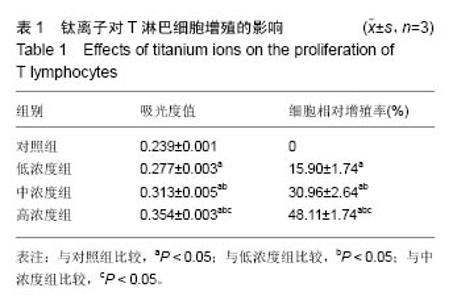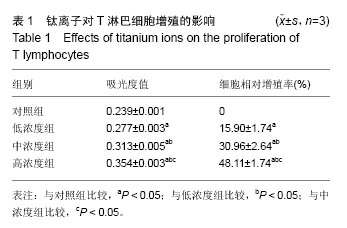Chinese Journal of Tissue Engineering Research ›› 2016, Vol. 20 ›› Issue (52): 7781-7787.doi: 10.3969/j.issn.2095-4344.2016.52.004
Previous Articles Next Articles
Effects of titanium ions on the proliferation and activation of T lymphocytes in vitro
- 1Department of Implantology, 2Department of Periodontics and Oral Medicine, Affiliated Stomatological Hospital of Guangxi Medical University, Nanning 530021, Guangxi Zhuang Autonomous Region, China
-
Received:2016-05-20Online:2016-12-16Published:2016-12-16 -
Contact:Tang Li, Associate chief physician, Associate professor, Master’s supervisor, Department of Implantology, Affiliated Stomatological Hospital of Guangxi Medical University, Nanning 530021, Guangxi Zhuang Autonomous Region, China -
About author:Chen Fu-jun, Studying for master’s degree, Department of Implantology, Affiliated Stomatological Hospital of Guangxi Medical University, Nanning 530021, Guangxi Zhuang Autonomous Region, China -
Supported by:the National Natural Science Foundation of China, No. 81160136, 81460108
CLC Number:
Cite this article
Chen Fu-jun, Chen Dong-hui, Yang Qian, Li Chang, Tang Li.
share this article

2.1 钛离子对T淋巴细胞增殖的影响 加入钛离子前各浓度组与对照组T淋巴细胞数量和形态基本一致,细胞单个均匀悬浮于培养基中。终浓度为25,50, 100 μmol/L钛离子作用于T淋巴细胞24 h后,倒置相差显微镜下可见:各浓度组细胞数量较对照组明显增多,细胞明显抱团生长形成集落,见图1。CCK-8法显示,低、中、高浓度组吸光度值分别为0.277±0.003、0.313±0.005、0.354±0.003,所对应的细胞相对增殖率分别为(15.90±1.74) %,(30.96±2.64) %,(48.11± 1.74) %,低、中、高浓度组吸光度值及细胞相对增殖率与对照组比较差异均有显著性意义(P < 0.05),不同浓度组之间两两比较差异有显著性意义(P < 0.05),见表1。说明钛离子可促进T淋巴细胞增殖,并呈浓度依赖性。"

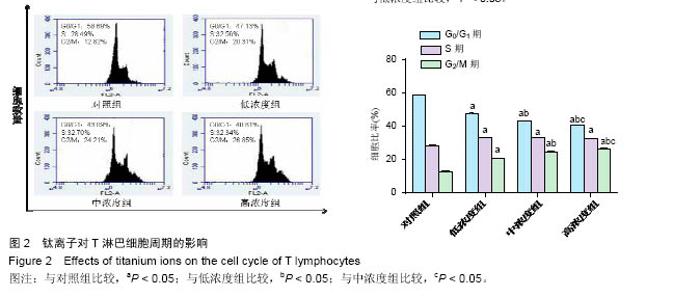
2.2 钛离子对T淋巴细胞周期的影响 使用PI染色结合流式细胞术分析钛离子对T淋巴细胞周期进程的结果显示,对照组细胞大多数处于G0/G1期;与对照组比较,低、中、高浓度组G0/G1期细胞比例显著减少(P < 0.05),S期、G2/M期细胞比例显著增加(P < 0.05);高浓度组G0/G1期细胞比例低于中、低浓度组(P < 0.05),中浓度组G0/G1期细胞比例低于低浓度组(P < 0.05);各浓度组S期细胞比例比较差异无显著性意义(P > 0.05);高浓度组G2/M期细胞比例高于中、低浓度组(P < 0.05),中浓度组G2/M期期细胞比例高于低浓度组(P < 0.05),见图2。说明钛离子可促进T淋巴细胞由G0/G1期向S期、G2/M期转换。"
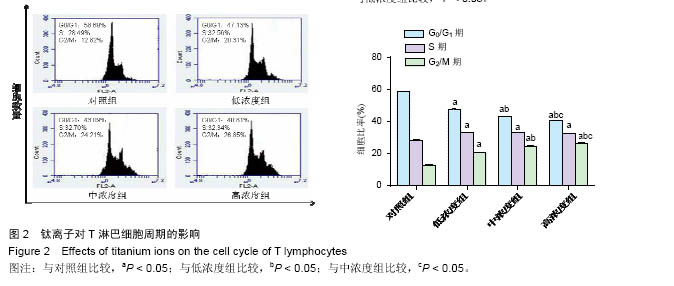
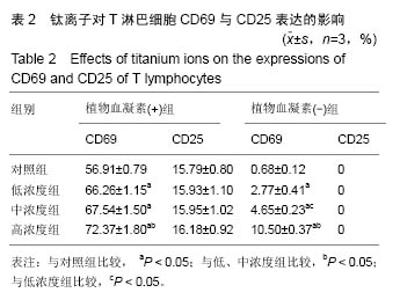
2.3 钛离子对T淋巴细胞表达早期活化抗原CD69和中期活化抗原CD25的影响 植物血凝素(+)组细胞中:高浓度组CD6表达率为(72.3±2.80)%,高于低、中浓度组及对照组(P < 0.05);低、中浓度组CD6表达率高于对照组(P < 0.05),低、中浓度组间CD6表达率比较差异无显著性意义(P > 0.05);各浓度组CD25表达与对照组比较差异无显著性意义,见表2。 植物血凝素(-)组细胞中:高浓度组CD69表达率为(10.5±1.33)%,高于低、中浓度组及对照组(P < 0.05),且具有浓度依赖性,各浓度组之间比较差异有显著性意义(P < 0.05);各浓度组及对照组均不表达CD25,见表2。 同一浓度钛离子作用下,植物血凝素(+)组细胞的CD69表达率显著高于植物血凝素(-)组细胞表达的量(P < 0.05)。说明钛离子可上调生理状态和炎症状态下T淋巴细胞早期活化抗原CD69的表达,但对中期活化抗原CD25的表达无明显影响。"
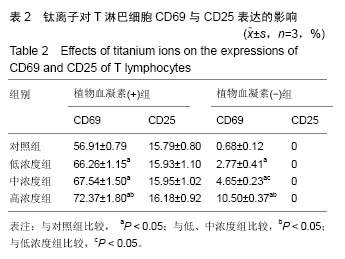
| [1]Branemark PI.Osseointegration and its experimental background.J Prosthet Dent.1983;50(3):399-410.[2]Astrand P,Nord PG,Branemark PI.Titanium implants and onlay bone graft to the atrophic edentulous maxilla: a 3-year longitudinal study.Int J Oral Maxillofac Surg. 1996;25(1):25-29.[3]王方辉,张姗姗,舒静媛,等.纯钛种植体表面改性对骨结合的影响[J].中国组织工程研究, 2014,18(52): 8491-8497.[4]Rodrigues DC,Valderrama P,Wilson TG,et al.Titanium Corrosion Mechanisms in the Oral Environment: A Retrieval Study.Materials.2013;6(11):5258-5274.[5]Reclaru L,Meyer JM.Study of corrosion between a titanium implant and dental alloys.J Dent. 1994;22(3): 159-168.[6]黄伟城,吴泽键,陈伟生.钛种植体基台和不同合金的体外耐腐蚀性能[J].中国组织工程研究, 2015,19(30):4784- 4789.[7]Martin SF.Tlymphocyte-mediated immune responses to chemical haptens and metal ions: implications for allergic and autoimmune disease.Int Arch Allergy Immunol.2004;134(3):186-198.[8]Goutam M,Giriyapura C,Mishra SK,et al.Titanium allergy: a literature review. Indian J Dermatol. 2014; 59(6):630.[9]Siddiqi A,Payne AG,De Silva RK,et al.Titanium allergy: could it affect dental implant integration?Clin Oral Implants Res.2011;22(7):673-680.[10]Wooley PH,Schwarz EM.Aseptic loosening.Gene Therapy.2004;11(4):402-407.[11]Wachi T,Shuto T,Shinohara Y,et al.Release of titanium ions from an implant surface and their effect on cytokine production related to alveolar bone resorption. Toxicology.2015;327:1-9.[12]Schliephake H,Reiss G,Urban R,et al.Metal release from titanium fixtures during placement in the mandible: an experimental study.Int J Oral Maxillofac Implants. 1993;8(5):502-511.[13]Lorenzo J,Horowitz M,Choi Y.Osteoimmunology: interactions of the bone and immune system.Endocr Rev.2008;29(4):403-440.[14]Takayanagi H.Inflammatory bone destruction and osteoimmunology.J Periodontal Res. 2005;40(4): 287-293.[15]Caetano-Lopes J,Canhao H,Fonseca JE. Osteoimmunology--the hidden immune regulation of bone.Autoimmun Rev.2009;8(3):250-255.[16]Arron JR, Choi Y.Bone versus immune system. Nature. 2000;408:535-536.[17]Takayanagi H.Osteoimmunology: shared mechanisms and crosstalk between the immune and bone systems. Nat Rev Immunol.2007;7(4):292-304.[18]王林红,樊立洁,谷志远.钛离子诱导骨吸收的现象及机制[J].国际口腔医学杂志,2009,36(4):441-443,447.[19]赵文杰,戴闽,张斌,等.钛金属离子介导骨溶解机制中的炎症反应-STAT信号通路[J].中国组织工程研究, 2016, 20(4): 492-496.[20]Mine Y,Makihira S, ikawa H,et al.Impact of titanium ions on osteoblast-, osteoclast- and gingival epithelial-like cells.J Prosthodont Res.2010;54(1):1-6.[21]庞振华,陈东晖,李秋莹,等.钛离子对 Jurkat T 细胞增殖及分泌骨改建相关因子的影响[J].广东医学, 2015, 36(22):3442-3445.[22]Funato A,Yamada M,Ogawa T.Success rate, healing time, and implant stability of photofunctionalized dental implants.Int J Oral Maxillofac Implants. 2013;28(5): 1261-1271.[23]Ettl T,Gerlach T,Schusselbauer T,et al.Bone resorption and complications in alveolar distraction osteogenesis.Clin Oral Investig.2010;14(5):481-489.[24]Messer RL,Tackas G,Mickalonis J,et al.Corrosion of machined titanium dental implants under inflammatory conditions.J Biomed Mater Res B Appl Biomater. 2009; 88(2):474-481.[25]陈灼庚,唐礼.种植体钛离子释放对骨及骨周免疫的影响[J].广东牙病防治,2015,23(1):51-54.[26]Chan E,Cadosch D,Gautschi OP,et al.Influence of metal ions on human lymphocytes and the generation of titanium-specific T-lymphocytes.J Appl Biomater Biomech.2011;9(2):137-143.[27]Suska F,Esposito M,Gretzer C,et al.IL-1alpha, IL-1beta and TNF-alpha secretion during in vivo/ex vivo cellular interactions with titanium and copper. Biomaterials. 2003;24(3):461-468.[28]Cadosch D,Sutanto M,Chan E,et al.Titanium uptake, induction of RANK-L expression, and enhanced proliferation of human T-lymphocytes.J Orthop Res. 2010;28(3):341-347.[29]Abraham RT,Weiss A.Jurkat T cells and development of the T-cell receptor signalling paradigm.Nat Rev Immunol. 2004;4(4):301-308.[30]Fujii T,Yamada S,Watanabe Y,et al.Induction of choline acetyltransferase mRNA in human mononuclear leukocytes stimulated by phytohemagglutinin, a T-cell activator. J Neuroimmunol.1998;82(1):101-107.[31]Fu Y,Zhang Y,Chang X,et al.Systemic immune effects of titanium dioxide nanoparticles after repeated intratracheal instillation in rat.Int J Mol Sci.2014;15(4): 6961-6973.[32]Alenzi FQ.Links between apoptosis, proliferation and the cell cycle. Br J Biomed Sci.2004;61(2):99-102.[33]Berridge M.Cell Cycle and Proliferation.Cell Signalling Biology.2014;2014(1):1-45.[34]Sancho D,Gomez M,Sanchez-Madrid F.CD69 is an immunoregulatory molecule induced following activation. Trends Immunol.2005;26(3):136-140.[35]Lindsey WB,Lowdell MW,Marti GE,et al.CD69 expression as an index of T-cell function: assay standardization, validation and use in monitoring immune recovery. Cytotherapy.2007;9(2):123-132.[36]Sang X,Fei M,Sheng L,et al.Immunomodulatory effects in the spleen-injured mice following exposure to titanium dioxide nanoparticles.J Biomed Mater Res A.2014;102(10):3562-3572.[37]Thornton AM,Shevach EM.CD4+CD25+ immunoregulatory T cells suppress polyclonal T cell activation in vitro by inhibiting interleukin 2 production. J Exp Med.1998;188(2):287-296.[38]Gonzalez-Garcia A,Merida I,Martinez AC,et al. Intermediate affinity interleukin-2 receptor mediates survival via a phosphatidylinositol 3-kinase-dependent pathway. J Biol Chem.1997;272(15):10220-10226.[39]Cachinho SC,Pu F,Hunt JA.Cytokine secretion from human peripheral blood mononuclear cells cultured in vitro with metal particles.J Biomed Mater Res A.2013; 101(4):1201-1209.[40]Li TF,Santavirta S,Waris V,et al.No lymphokines in T-cells around loosened hip prostheses.Acta Orthop Scand.2001;72(3):241-247. |
| [1] | Zhang Tongtong, Wang Zhonghua, Wen Jie, Song Yuxin, Liu Lin. Application of three-dimensional printing model in surgical resection and reconstruction of cervical tumor [J]. Chinese Journal of Tissue Engineering Research, 2021, 25(9): 1335-1339. |
| [2] | Li Cai, Zhao Ting, Tan Ge, Zheng Yulin, Zhang Ruonan, Wu Yan, Tang Junming. Platelet-derived growth factor-BB promotes proliferation, differentiation and migration of skeletal muscle myoblast [J]. Chinese Journal of Tissue Engineering Research, 2021, 25(7): 1050-1055. |
| [3] | Liu Cong, Liu Su. Molecular mechanism of miR-17-5p regulation of hypoxia inducible factor-1α mediated adipocyte differentiation and angiogenesis [J]. Chinese Journal of Tissue Engineering Research, 2021, 25(7): 1069-1074. |
| [4] | Zeng Yanhua, Hao Yanlei. In vitro culture and purification of Schwann cells: a systematic review [J]. Chinese Journal of Tissue Engineering Research, 2021, 25(7): 1135-1141. |
| [5] | Ma Zetao, Zeng Hui, Wang Deli, Weng Jian, Feng Song. MicroRNA-138-5p regulates chondrocyte proliferation and autophagy [J]. Chinese Journal of Tissue Engineering Research, 2021, 25(5): 674-678. |
| [6] | Xu Dongzi, Zhang Ting, Ouyang Zhaolian. The global competitive situation of cardiac tissue engineering based on patent analysis [J]. Chinese Journal of Tissue Engineering Research, 2021, 25(5): 807-812. |
| [7] | Wang Yujiao, Liu Dan, Sun Song, Sun Yong. Biphasic calcium phosphate loaded with advanced platelet rich fibrin can promote the activity of rabbit bone marrow mesenchymal stem cells [J]. Chinese Journal of Tissue Engineering Research, 2021, 25(4): 504-509. |
| [8] | Zhou Jihui, Yao Meng, Wang Yansong, Li Xinzhi, Zhou You, Huang Wei, Chen Wenyao. Influence of novel nanoscaffolds on biological behaviors of neural stem cells and the related gene expression [J]. Chinese Journal of Tissue Engineering Research, 2021, 25(4): 532-536. |
| [9] | Li Xingping, Xiao Dongqin, Zhao Qiao, Chen Shuo, Bai Yiguang, Liu Kang, Feng Gang, Duan Ke. Preparation and properties of copper-loaded antibacterial functional film on titanium surface [J]. Chinese Journal of Tissue Engineering Research, 2021, 25(4): 553-557. |
| [10] | Wu Zijian, Hu Zhaoduan, Xie Youqiong, Wang Feng, Li Jia, Li Bocun, Cai Guowei, Peng Rui. Three-dimensional printing technology and bone tissue engineering research: literature metrology and visual analysis of research hotspots [J]. Chinese Journal of Tissue Engineering Research, 2021, 25(4): 564-569. |
| [11] | Shi Xiaoxiu, Mao Shilong, Liu Yang, Ma Xingshuang, Luo Yanfeng. Comparison of tantalum and titanium (alloy) as orthopedic materials: physical and chemical indexes, antibacterial and osteogenic ability [J]. Chinese Journal of Tissue Engineering Research, 2021, 25(4): 593-599. |
| [12] | Chang Wenliao, Zhao Jie, Sun Xiaoliang, Wang Kun, Wu Guofeng, Zhou Jian, Li Shuxiang, Sun Han. Material selection, theoretical design and biomimetic function of artificial periosteum [J]. Chinese Journal of Tissue Engineering Research, 2021, 25(4): 600-606. |
| [13] | Liu Fei, Cui Yutao, Liu He. Advantages and problems of local antibiotic delivery system in the treatment of osteomyelitis [J]. Chinese Journal of Tissue Engineering Research, 2021, 25(4): 614-620. |
| [14] | Li Xiaozhuang, Duan Hao, Wang Weizhou, Tang Zhihong, Wang Yanghao, He Fei. Application of bone tissue engineering materials in the treatment of bone defect diseases in vivo [J]. Chinese Journal of Tissue Engineering Research, 2021, 25(4): 626-631. |
| [15] | Zhang Zhenkun, Li Zhe, Li Ya, Wang Yingying, Wang Yaping, Zhou Xinkui, Ma Shanshan, Guan Fangxia. Application of alginate based hydrogels/dressings in wound healing: sustained, dynamic and sequential release [J]. Chinese Journal of Tissue Engineering Research, 2021, 25(4): 638-643. |
| Viewed | ||||||
|
Full text |
|
|||||
|
Abstract |
|
|||||
